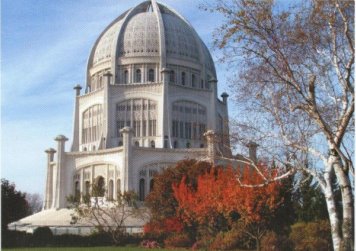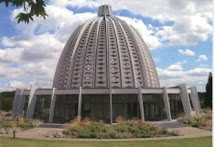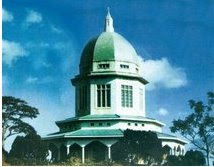In April 1863, before leaving Baghdad, Bahá'u'lláh and His companions camped in a garden on the banks of the Tigris River. From 21 April to 2 May, Bahá'u'lláh shared with those Bábis in His company that He was the Promised One foretold by the Báb--foretold, indeed, in all the world's scriptures.
The garden became known as the Garden of Ridwan, which indicates "paradise" in Arabic. The anniversary of the twelve days spent there are celebrated in the Bahá'í world as the most joyous of holidays, known as the Ridwan Festival.
On 3 May 1863, Bahá'u'lláh rode out of Baghdad, on His way to Constantinople, the imperial capital, accompanied by His family and selected companions. He had become an immensely popular and cherished figure. Eyewitnesses described the departure in moving terms, noting the tears of many scholars, government officials and onlookers and the honor paid to Him by the authorities. After four months in Constantinople, Bahá'u'lláh was sent as a virtual state prisoner to Adrianople (modern Edirne), arriving there on 2 December 1863. During the five years He spent there, Bahá'u'lláh's reputation continued to grow, attracting the intense interest of scholars, government officials and diplomats.
He refers to His Declaration as “the Day of supreme felicity” and He describes the Garden of Ridwán as “the Spot from which He shed upon the whole of creation the splendours of His Name, the All-Merciful”.
The Declaration of Bahá’u’lláh is celebrated annually by the twelve-day Ridwán Festival, described by Shoghi Effendi as “the holiest and most significant of all Bahá’í festivals”
Baha'u'llah called Ridwan the Most Great Festival and the King of Festivals. He said:
"Call ye to mind, O people, the bounty which God hath conferred upon you. Ye were sunk in slumber, and lo! He aroused you by the reviving breezes of His Revelation, and made known unto you His manifest and undeviating Path"
The garden became known as the Garden of Ridwan, which indicates "paradise" in Arabic. The anniversary of the twelve days spent there are celebrated in the Bahá'í world as the most joyous of holidays, known as the Ridwan Festival.
On 3 May 1863, Bahá'u'lláh rode out of Baghdad, on His way to Constantinople, the imperial capital, accompanied by His family and selected companions. He had become an immensely popular and cherished figure. Eyewitnesses described the departure in moving terms, noting the tears of many scholars, government officials and onlookers and the honor paid to Him by the authorities. After four months in Constantinople, Bahá'u'lláh was sent as a virtual state prisoner to Adrianople (modern Edirne), arriving there on 2 December 1863. During the five years He spent there, Bahá'u'lláh's reputation continued to grow, attracting the intense interest of scholars, government officials and diplomats.
He refers to His Declaration as “the Day of supreme felicity” and He describes the Garden of Ridwán as “the Spot from which He shed upon the whole of creation the splendours of His Name, the All-Merciful”.
The Declaration of Bahá’u’lláh is celebrated annually by the twelve-day Ridwán Festival, described by Shoghi Effendi as “the holiest and most significant of all Bahá’í festivals”
Baha'u'llah called Ridwan the Most Great Festival and the King of Festivals. He said:
"Call ye to mind, O people, the bounty which God hath conferred upon you. Ye were sunk in slumber, and lo! He aroused you by the reviving breezes of His Revelation, and made known unto you His manifest and undeviating Path"






No comments:
Post a Comment